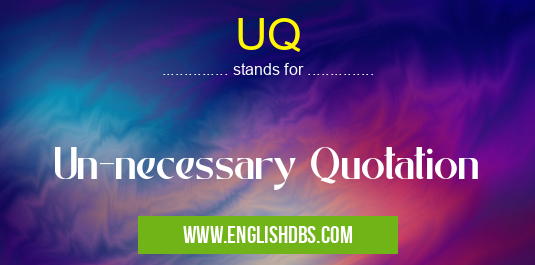What does UQ mean in CHAT
UQ stands for Un-necessary Quotation — a phrase used to describe when someone is quoting something that has no relevancy or importance to the topic at hand. It's often used when someone brings up an irrelevant comment, quote, or saying in a conversation without adding any real value. UQs can be both annoying and distracting, so it's important to recognize and avoid them in conversations.

UQ meaning in Chat in Internet
UQ mostly used in an acronym Chat in Category Internet that means Un-necessary Quotation
Shorthand: UQ,
Full Form: Un-necessary Quotation
For more information of "Un-necessary Quotation", see the section below.
Definition
UQ stands for Un-necessary Quotation. This term is commonly used to describe when someone uses a quote from another source but fails to add any relevance or value to the conversation or discussion. UQs can usually be identified by the lack of context in which the quotation was said, as well as the lack of relevance surrounding it.
Examples
Some examples of unnecessary quotations include using celebrity quotes without providing any meaningful commentary on their relevance; using quotes from ancient texts without providing an explanation of what they have to do with the current discussion; or using quotes from politicians that do not pertain directly to the topic being discussed. In all of these cases, the quotation adds little if any information and therefore should be avoided if possible.
Essential Questions and Answers on Un-necessary Quotation in "INTERNET»CHAT"
What is UQ?
UQ stands for Un-necessary Quotation. It is a practice of using irrelevant or overused phrases in written communication. UQ is often considered bad writing habit that can be difficult to break.
Why should I avoid UQ?
Using unnecessary quotes in your writing can create an amateurish impression and detract from the overall quality of your work. Using too many quotations can also make it difficult for readers to understand the main points of your argument.
How do I spot unnecessary quotation marks?
Unnecessary quotes are usually words or phrases that are already implied by the context, or which have become so common that they have lost their original meanings. Be sure to read through any text carefully and ask yourself if the quote is necessary before you include it in your writing.
What type of words should I avoid including in my writing?
It's best to avoid including clichés, colloquialisms, jargon, and other overused expressions in your writing. Instead, opt for unique and creative ways of expressing yourself without having to rely on unoriginal quotation marks.
How do I ensure that I'm not using unnecessary quotes?
One way to ensure you're not using unnecessary quotes is to read through any text carefully before publishing it. Make sure all the words used are necessary and relevant to the message you want to convey instead of relying on unoriginal quotations.
Are there any formatting guidelines for avoiding UQ?
Yes! Before hitting ‘publish', double check all punctuation marks for accuracy as incorrect use of quotation marks may be interpreted as Un-necessay Quotations (UQ). Also, keep an eye out for styling issues that may complicate matters - such as bold text for quoted phrases - as this could lead some readers to thinking it was a quote when it wasn't actually one.
What are some alternatives to using quotation marks?
You can replace some commonly used phrases with other more precise words or expressions such as synonyms, metaphors, idioms or even just single words instead of whole sentences surrounded by quotation marks. This will help keep your tone fresh and interesting while still conveying your point effectively without resorting to cliches.
Is there a good rule of thumb when deciding when/where to use quotes?
If a quote doesn't add anything new or important enough that cannot simply be said without them then omit them completely — sticking only with those which add detail and meaning beyond what could just be stated in plain English or any other language being used.
Can quotations still be effective even when not strictly necessary?
Yes! Quotations can still be an effective tool if correctly incorporated into your work. For example if a particular phrase has greater resonance with readers than simply saying it another way then by all means include it — but only if absolutely needed.
What are some tips on how I can avoid UQs in my own writing style?
Writing style is often personal preference but there are some useful techniques you might consider such as avoiding repetition in your speech/writing; replacing long/convoluted sentences with simpler ones; try not use overused phrases like ‘at the end of the day' etc.; strive for clarity above all else & don't forget less can often mean more!
Final Words:
In conclusion, UQ stands for Un-necessary Quotation and refers to when someone adds a quote or saying into a conversation that lacks context or relevance. While some quotations may add value, in most instances it is better practice to avoid them in order to keep conversations clear and concise.
